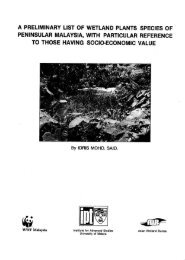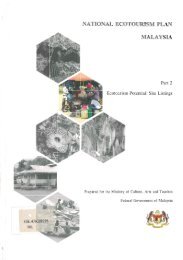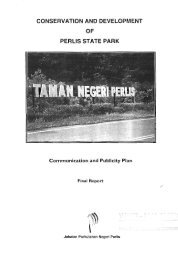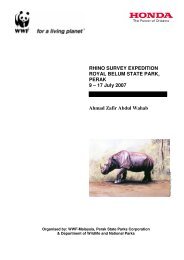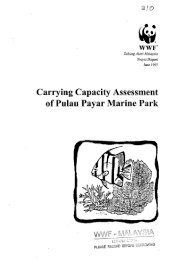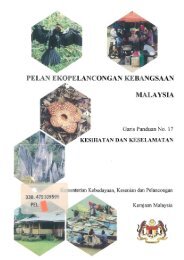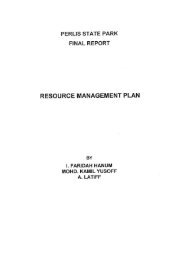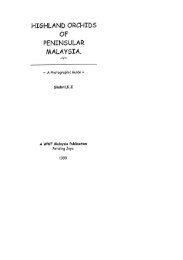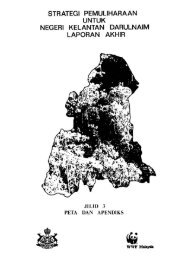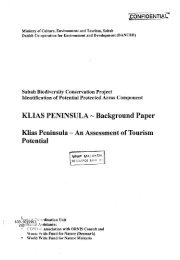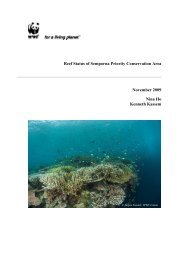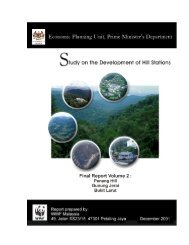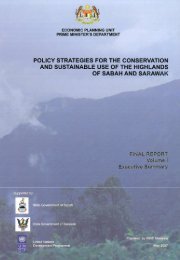FINAL VERSION FOR APPROVAL - Sdn Bhd - WWF Malaysia
FINAL VERSION FOR APPROVAL - Sdn Bhd - WWF Malaysia
FINAL VERSION FOR APPROVAL - Sdn Bhd - WWF Malaysia
Create successful ePaper yourself
Turn your PDF publications into a flip-book with our unique Google optimized e-Paper software.
Gunung Stong State Park Preliminary Management Plan<br />
Unlike mass tourism sites, visitors to protected areas are generally not in the habit of buying<br />
souvenirs (except for the occasional T-shirt or key-chain); this could also be the reason why<br />
sales of souvenirs have not been encouraging. Nevertheless, basic training in operating small<br />
businesses is necessary, and must be an ongoing process among the local communities in<br />
areas surrounding GSSP. With basic training, the local communities will be encouraged to<br />
venture into any business that they feel is viable within the setting of the GSSP.<br />
6.19.4 Local Outdoor Recreation Club<br />
The boom in outdoor recreation is symptomatic of <strong>Malaysia</strong>’s greatly improved standard of<br />
living, with greater disposable incomes and more leisure time. This can be attested by the<br />
greater number of <strong>Malaysia</strong>ns visiting recreational forests, national parks and marine parks,<br />
the proliferation of outdoor clubs (public and in universities), the large number of outwardbound-type<br />
camps, publication of outdoor recreation magazines, and the proliferation of<br />
camping and fishing equipment shops.<br />
The recent introduction of the National Service programme will add to the number, as more<br />
<strong>Malaysia</strong>ns will be exposed to the outdoors. This will lead to greater pressure for the<br />
government to improve on environmental sustainability, and the establishment of more<br />
protected areas.<br />
The formation of a local outdoor recreation club should be encouraged as many outdoor<br />
recreation clubs have already visited GSSP. The local outdoor recreation club would be part<br />
of the local site support group (see section 6.20), especially if nature appreciation is<br />
incorporated into the activities of the club. Members of the club could be trained to become<br />
part-time guides, and hopefully be drawn away from negative activities such as drug abuse,<br />
vandalism and motorcycle racing.<br />
6.20 Local Site Support Group (SSG)<br />
A local Site Support Group (SSG) should be formed, comprising representatives of the<br />
following:<br />
(i) BAT and non-BAT guides.<br />
(ii)<br />
(iii)<br />
(iv)<br />
(v)<br />
(vi)<br />
(vii)<br />
(viii)<br />
Operators of homestays and souvenir stands.<br />
Operators of restaurants and coffee shops that directly benefit from tourism.<br />
Agro-tourism operators.<br />
School nature clubs.<br />
Outdoor recreation club.<br />
GSSP.<br />
KESEDAR.<br />
This well-represented and diversified group of local stakeholders, banding together under an<br />
umbrella group, will complement the programmes and operations of GSSP. The SSG should<br />
meet regularly, to discuss issues that are raised and participate in events and activities<br />
organised, such as trail clean-ups and climbathons, which will not only promote GSSP, but<br />
also provide positive identification of the group with GSSP. However, as a cautionary<br />
principle, the activities and events that are promoted should not be at the expense of<br />
conservation, which the primary purpose for the formation of GSSP.<br />
6.21 Promotion and Marketing<br />
As elaborated in Section 4.3, <strong>Malaysia</strong>ns make up about 80% of the visitors to GSSP, with<br />
those aged between 20 and 40 years, and males accounting for some 70% of the visitors.<br />
With most of them enjoying the outdoors, and participating in hiking and camping activities,<br />
102



